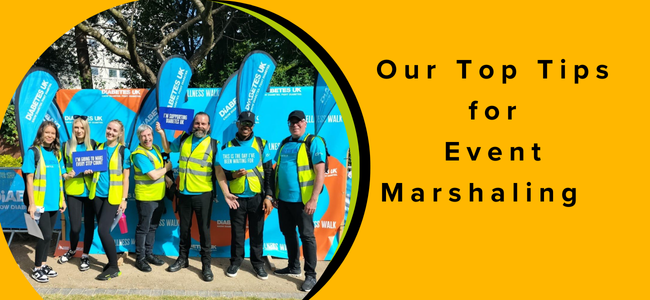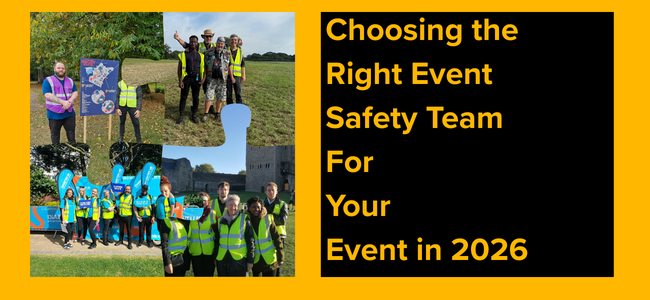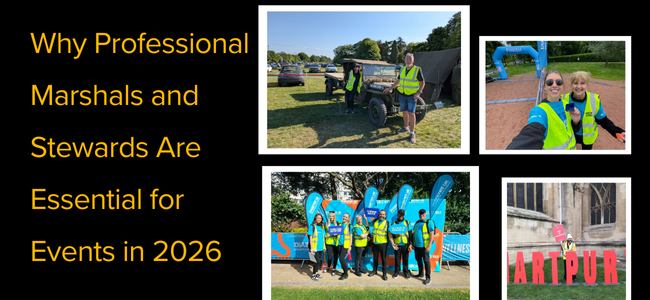The Difference Between Marshals, Stewards and Security Staff When planning an event, one of the…

Top Tips for Event Marshaling | Marshals & Stewards Agency
Marshaling Matters: Our Top Tips for a Smooth-Running Event
Whether you’re planning a music festival, sporting event, school fair or city parade, there’s one team you simply can’t do without: your marshals.
Often the first people guests see when they arrive—and the last line of defence when something goes wrong—marshals are the backbone of a successful and safe event. From guiding traffic to calming crowds and answering questions, they wear many hats. So how do you ensure they’re confident, competent, and ready for anything?
At Marshals & Stewards Agency, we’ve supported events across the UK with professional marshals for years. We’ve put together a downloadable tip sheet (link at the end) that breaks down everything your marshaling team needs to know. But in this blog, we’re giving you a taste of what makes effective marshaling—and why it matters more than you think.
Why Event Marshaling Should Never Be an Afterthought
When event planning gets busy—and let’s face it, it always does—it’s tempting to leave marshaling to the last minute or treat it as a tick-box task. But marshaling isn’t just about filling jackets with bodies. It’s about putting the right people in the right places and giving them the tools to succeed.
Good marshaling means:
Helping people feel safe and welcomed
Preventing problems before they escalate
Responding quickly if something goes wrong
Without trained, briefed, and alert marshals, even the best-planned event can descend into confusion.
What Makes a Great Marshal?
You don’t need superhero powers to be a great marshal—but a few key qualities go a long way.
Great marshals are:
Clear communicators – able to give calm, simple instructions
Observant – quick to spot something out of place
Approachable – friendly enough that guests feel comfortable asking for help
Calm under pressure – because things don’t always go to plan
Well-informed – familiar with the layout, key contacts, and procedures
These aren’t just “nice-to-haves”—they’re essential when the safety and experience of hundreds (or thousands) of attendees are in your hands.
Before the Event: Planning is Everything
One of the biggest mistakes we see? Leaving marshals to figure things out on the day. A strong pre-event briefing sets the tone. It ensures your team understands the event’s goals, layout, emergency procedures, and their own specific responsibilities.
Think of it as the difference between setting people up to succeed… or to scramble.
In our downloadable guide, we outline exactly what to include in your marshal briefing—from key contact numbers to what to do in a medical emergency.
The Day Itself: Stay Visible, Stay Connected
High-vis jackets are the obvious start, but visibility is more than what you’re wearing. It’s about posture, presence, and being available.
Guests often turn to marshals when they’re unsure, lost, or stressed. A marshal who’s confident, friendly and alert can completely change someone’s experience of the event—for the better.
Just as important is communication. Whether via radios or check-in points, a connected team is an effective team. Marshals need to share information quickly and clearly, especially if something unexpected occurs.
It’s Not Just About Problems—It’s About People
Too often, marshals are seen as problem-solvers only. But they’re also ambassadors. They shape the atmosphere, guide the mood, and often help attendees feel welcome and secure without even realising it.
Simple acts like:
Smiling and greeting people
Giving clear directions
Assisting someone struggling with mobility or a pram
…are all part of the marshaling role. Good customer service isn’t a bonus—it’s a fundamental part of the job.
Anticipation Over Reaction
In marshaling, the best outcomes often happen before anyone realises there’s a problem. Proactive marshals look for pinch points, overcrowding, or confusion before they become safety issues. They reposition themselves without needing to be told. They see the lost child before the parent notices.
This mindset can be the difference between a hiccup and a full-scale incident.
Don’t Forget the Basics
Among all the moving parts of an event, don’t lose sight of the non-negotiables:
Emergency access routes must stay clear
Walkways should be unobstructed
All marshals should know where the nearest first aid point is
Even if nothing “big” goes wrong, small oversights can lead to injuries or unhappy guests.
A Final Word on Professionalism
It’s worth remembering that for many attendees, marshals are the public face of your event. Their demeanour reflects on your brand, your team, and your overall standards.
So whether you’re relying on volunteers, part-time helpers or professional stewards, take the time to train, brief and support them properly.
If you’re unsure where to start, that’s exactly why we’ve created a free downloadable tip sheet, packed with practical guidance on preparing your marshaling team.
📥 Download Our Marshal Tips Sheet
Want the full breakdown of our best practices?
[Click here to download our Event Marshal Tip Sheet.]
(It’s free, and there’s no sign-up required.)
Frequently Asked Questions: Hiring Marshals for Your Event
Q: Can I use volunteers as marshals?
Yes, for smaller events—but ensure they’re well-briefed. For larger or high-risk events, professional marshals are highly recommended.
Q: What makes a marshal ‘professional’?
Training, experience, and the ability to remain calm and competent in a wide range of scenarios. Professional marshals are also covered by insurance.
Q: How early should I book marshals?
The sooner the better—especially during busy event seasons. Ideally, build them into your planning from the start.
Q: Do I need different marshals for traffic and crowds?
Sometimes, yes. Those managing vehicle movements require specific training and PPE. Make sure you assign duties accordingly.
Q: Where can I get more guidance?
Download our tip sheet—or contact us if you’d like help planning the marshaling side of your event.
Wrapping Up: Smart Marshaling = Smooth Event
When it comes to successful events, logistics matter—but people matter more. Having the right marshaling team in place, well-briefed and well-supported, is one of the best ways to safeguard your event’s success.
Don’t leave it to chance—plan, prepare, and prioritise your marshals.
And if you’d like more practical advice, our Marshal Tip Sheet has everything you need to get started.


